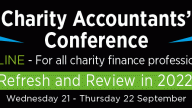Top five tips for grants fundraising
Fundraising specialist Neela Jane Stansfield reveals her top tips for grant fundraising.
Ever since I started fundraising, it’s been “a competitive time” out there. Funding requests have always outnumbered the available grants given out, as charitable need has always exceeded philanthropic supply. Lately, though, things seem to be beyond challenging.
Fifteen years ago we were reeling from the 2007-8 financial crash. Who could’ve imagined that fast-forward just over a decade and we’d all be dealing with the aftermath of a global pandemic, the biggest rise in inflation since the 80s, and an unprecedented cost of living crisis. Plus, as I type this next to a fan, temperatures have hit their highest on record as one of the increasingly worrying effects of climate change. What a time for everyone – and what a time to be trying to fundraise! With all this going on, us grant-seeking charities find ourselves overwhelmed in service demand and funding need, and our grant-making counterparts find themselves overwhelmed in applications. Yikes.
So in such an extra-pressurised, extra-competitive situation, what can we do to give ourselves the best chance of winning those harder-than-ever-to-secure grants? Here are my top five tips for grant-seekers of all types and sizes of organisation:
1. It’s all about the relationship
We tend to focus a lot on how to write and present our funding applications, which is important, but really only one piece of the puzzle. The relationships we develop with funders are what make the biggest difference to success rates. Prioritise getting to know your funders and having them get to know you – meetings, events, telephone and video calls are all simple but effective ways of building funder engagement. And the more face-to-face the interaction is, the better.
2. Use and build your networks
You don’t need to be a large or well-publicised charity to have a network of people that can help your grants fundraising. Influencers, or “peer-to-peer” connectors, who can make introductions to funders on your behalf are gold dust. Even one or two of these people can help open doors to new prospects, who in turn can make further introductions, and so your network grows. Ask your trustee board and any well-connected volunteers, patrons or supporters and see where it takes you.
3. Frame your ask around your beneficiaries
Are you looking for a funder to support a particular activity or element of a project? That’s great, but remember to frame your proposition around the outcome you’re looking to achieve, rather than overly-focussing on the detail of the activity itself. Funders want to know exactly what they’d be supporting and how the project will work, but they really want to know how their grant will affect change. Focus on those outcomes, and the beneficiaries they affect, most of all.
4. Go the extra mile
The devil is in the detail, and little personal touches help you stand out amongst the rest. An extra handwritten note, a supporting phone call from your chairperson, or even just small things like taking care to hand-sign documents can give you the edge over the competition. Think bespoke and thoughtful, rather than anything that looks mass-produced or part of a round-robin appeal. You probably bin impersonal circulars that plop through your own letterbox at home; avoid over-stretched funders doing the same with your proposal by putting in the extra effort.
5. Prioritise your current funders
‘New business, new business, new business’… there’s a lot of pressure on grant-seekers to find exciting new prospects. Prospecting is a crucial part of any grants fundraising strategy, but it should never be at the expense of your existing relationships. Current funders are your absolute best shot – they’re warm, they know you, the engagement legwork has already been done and with the right stewardship they can become long-term, high lifetime value supporters. They may even increase their giving level if you can grow their understanding and passion for your cause, and could introduce other funders in their own networks to come on-board. Get personal and creative with your funder-love.
And a bonus tip: recruit relationship-builders, not just writers
Is grants fundraising about writing excellent and engaging proposals? Yes. Is it ALL about that? Nope. Most of the above points require something more than fab writing skills; they require really great interpersonal skills. People give to people, and that includes grant-makers (who are made up of people, after all, just like your charity is). So when you’re recruiting into your grants fundraising team, look beyond just the writing element. Look for those candidates that are interested in getting to know funders’ motivations and who can build relationships that take your grants fundraising to the next level. That’s the not-so-big secret to success.
About Neela Jane Stanfield
 Neela Jane Stansfield is a major gifts fundraising specialist, with over 15 years of experience working with trusts, foundations and high net worth individuals. She has worked across the international development, health and education sectors, including UNICEF, Marie Curie, The Stroke Association and Chatteris Educational Foundation in Hong Kong.
Neela Jane Stansfield is a major gifts fundraising specialist, with over 15 years of experience working with trusts, foundations and high net worth individuals. She has worked across the international development, health and education sectors, including UNICEF, Marie Curie, The Stroke Association and Chatteris Educational Foundation in Hong Kong.
Neela Jane was Chair of the Chartered Institute of Fundraising (CIoF)’s Trusts and Statutory Special Interest Group for six years and a board member and speaker at the CIoF National Convention. She holds a BSc in Psychology from the University of Nottingham and a diploma in fundraising from the CIoF, and has written about trusts fundraising for Third Sector magazine and The Guardian’s Voluntary Sector Network. She has also been a Trustee for an international children’s charity, Children in Crisis, and for the Anti-Trafficking and Labour Exploitation Unit (ATLEU).



